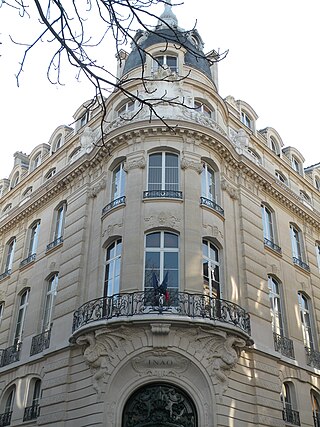
Stevia is a sweet sugar substitute extracted from the leaves of the plant species Stevia rebaudiana native to Paraguay and Brazil.

Urtica dioica, often known as common nettle, burn nettle, stinging nettle or nettle leaf, or just a nettle or stinger, is a herbaceous perennial flowering plant in the family Urticaceae. Originally native to Europe, much of temperate Asia and western North Africa, it is now found worldwide. The species is divided into six subspecies, five of which have many hollow stinging hairs called trichomes on the leaves and stems, which act like hypodermic needles, injecting histamine and other chemicals that produce a stinging sensation upon contact.

Lecithin is a generic term to designate any group of yellow-brownish fatty substances occurring in animal and plant tissues which are amphiphilic – they attract both water and fatty substances, and are used for smoothing food textures, emulsifying, homogenizing liquid mixtures, and repelling sticking materials.

In France, the appellation d'origine contrôlée (AOC) is a label that identifies an agricultural product whose stages of production and processing are carried out in a defined geographical area – the terroir – and using recognized and traditional know-how. The specificity of an AOC product is determined by the combination of a physical and biological environment with established production techniques transmitted within a human community that, together, give the product its distinctive qualities. These crucial technical and geographic factors are set forth in standards for each product, including wines, cheeses and meats. Other countries and the European Union have similar labeling systems. The European Union's protected designation of origin system has now harmonized the protection of all geographical indications and their registration. When labelling wine however, producers may still use recognized traditional terms like AOC, and are not required to display the PDO and PGI logos or terms, mostly for aesthetic purposes.

The International Plant Protection Convention (IPPC) is a 1951 multilateral treaty overseen by the United Nations Food and Agriculture Organization that aims to secure coordinated, effective action to prevent and to control the introduction and spread of pests of plants and plant products. The Convention extends beyond the protection of cultivated plants to the protection of natural flora and plant products. It also takes into consideration both direct and indirect damage by pests, so it includes weeds. IPPC promulgates International Standards for Phytosanitary Measures (ISPMs).

The metayage system is the cultivation of land for a proprietor by one who receives a proportion of the produce, as a kind of sharecropping. Another class of land tenancy in France is named fermage, whereby the rent is paid annually in banknotes. A farm operating under métayage was known as a métairie, the origin of some place names in areas where the system was used, such as Metairie, Louisiana.
The Agreement on the Application of Sanitary and Phytosanitary Measures, also known as the SPS Agreement or just SPS, is an international treaty of the World Trade Organization (WTO). It was negotiated during the Uruguay Round of the General Agreement on Tariffs and Trade (GATT), and entered into force with the establishment of the WTO at the beginning of 1995. Broadly, the sanitary and phytosanitary ("SPS") measures covered by the agreement are those aimed at the protection of human, animal or plant life or health from certain risks.

Association Max Havelaar France is the French member of FLO International, which unites 23 Fairtrade producer and labelling initiatives across Europe, Asia, Latin America, North America, Africa, Australia and New Zealand.

The smoking age is the minimum legal age required to purchase or use tobacco or cannabis products. Most countries have laws that forbid sale of tobacco products to persons younger than certain ages, usually the age of majority.

Bruno Le Maire is a French politician, writer, and former diplomat who has served as Minister of the Economy and Finance since 2017 under President Emmanuel Macron. A former member of The Republicans (LR), which he left in 2017 to join La République En Marche! (LREM), he was Secretary of State for European Affairs from 2008 to 2009 and Minister of Food, Agriculture and Fishing from 2009 to 2012 under President Nicolas Sarkozy. Le Maire is also a noted author, with his book Des hommes d'État winning the 2008 Edgar Faure Prize.

Agricultural pollution refers to biotic and abiotic byproducts of farming practices that result in contamination or degradation of the environment and surrounding ecosystems, and/or cause injury to humans and their economic interests. The pollution may come from a variety of sources, ranging from point source water pollution to more diffuse, landscape-level causes, also known as non-point source pollution and air pollution. Once in the environment these pollutants can have both direct effects in surrounding ecosystems, i.e. killing local wildlife or contaminating drinking water, and downstream effects such as dead zones caused by agricultural runoff is concentrated in large water bodies.
An agricultural attaché is a diplomat who collects, analyzes, and acts on information on agriculture, agribusiness, food, and other related spheres in a foreign country or countries. Agricultural attachés may be directly employed by the sending country's agriculture ministry, or they may be employed by the foreign ministry. Typical activities of an agricultural attaché include reporting on crop conditions, food availability, domestic agricultural policy and the foreign trade outlook in agricultural commodities; negotiating food aid agreements and agricultural credit lines; implementing agricultural technical assistance programs; facilitating professional contacts, exchanges, and technology transfer; assisting in negotiating bilateral and multilateral trade agreements; and promoting the exports of agricultural and food products. In many cases, agricultural attachés may also bear responsibility for issues related to the environment, food security, food safety, fisheries, forestry, and indeed anything related to rural areas and the rural economy.
Charles Eugène Bertrand was a French botanist, paleobotanist and geologist. He is remembered for his research involving the formation of coal.

Avril is an international agro-industrial group based in France, specialising in food, animal feed, energy and sustainable chemistry. It was founded in 1983, on the initiative of a collective group of leaders in the French farming sector, and was structured as a subsidiary to ensure outlets for French oilseeds and protein crops.

Cannabis in France is illegal for personal use, but remains one of the most popular illegal drugs. Limited types of cannabis-derived products are permitted for medical uses.
Bernard J. Blum was a French agricultural scientist, industry manager and founding president of the International Biocontrol Manufacturers' Association (IBMA). He campaigned for sustainable development through biological and integrated plant protection with the use of decision-making systems.

Groupe Roullier is a French agribusiness conglomerate founded in 1959 in Saint-Malo, France, by Daniel Roullier. The company specializes in the production and chemical processing of nutrients and feeds for plants, animals and humans. Groupe Roullier employs more than 8,000 people, its products are sold in 131 countries, with a consolidated turn-over of €2 billion.
Reconquête, styled as Reconquête! (R!), is a nationalist political party in France founded in late 2021 by Éric Zemmour, who has since served as its leader. He was a far-right candidate in the 2022 presidential election, in which he placed fourth with just over 7% of the vote as the best newcomer.

Parc naturel régional de la Martinique is one of 54 French regional nature parks. With a surface area of approximately 63,000 ha (240 sq mi), it covers more than half of the island, overlapping 32 of 34 communes - including approximately 100,000 inhabitants. The park works to preserve one of 34 biodiversity hotspots on the planet. The biodiversity hotspot map identifies areas for preservation by two criteria, one being a certain rate of endemism: that the flora and fauna are not found elsewhere, and because at least 70% of its primary vegetation has been lost.














